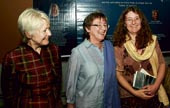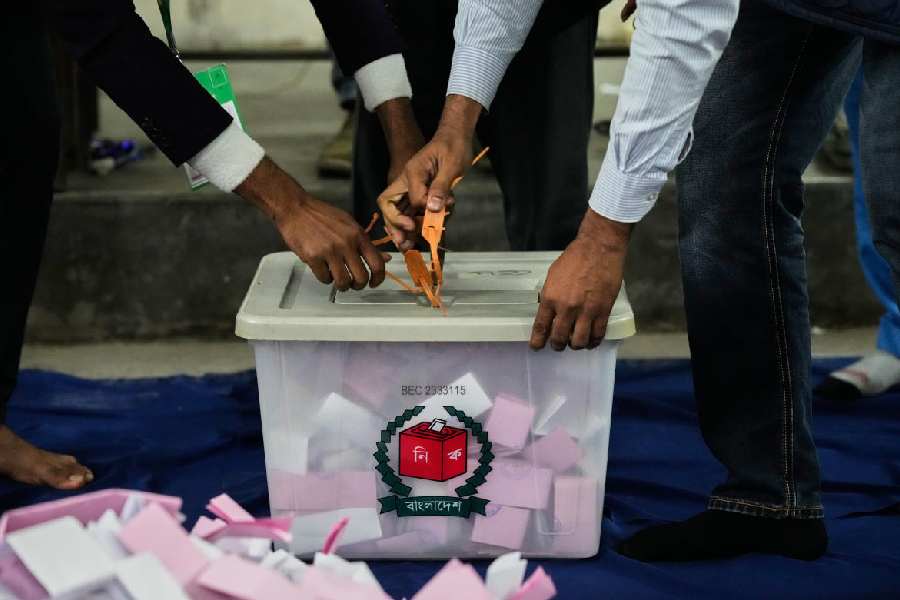 |
 |
| Rhyme and rhythm: Scottish poets at the Scotland Calcutta Poetry evening and (above) Arthur Flowers performs. Picture by Sanjoy Chattopadhyaya |
What do you do if you are moved to insomnia by the sight of a cow starving because a cruel winter has frozen all the grass? Well, if you are Scottish, you write a poem about it. This and much more was on offer at the Scotland Calcutta Poetry evening at the Srijan Rooftop Poetry Café on Thursday.
Scottish poetry is not only about Burns. The poet Robyn Marsack spoke on Scottish poetry and the Scottish Poetry Library in Edinburgh, followed by poetry readings by Christine De Luca and Mandy Haggith.
Established in 1984, the Poetry Library is a storehouse for all kinds of Scottish poetry written or recorded, said Marsack. It aims to “make poetry as popular as rock ’n’ roll”. And when Marsack read out Kidspoem — by Glasgow-based poet Liz Lochhead — about a child’s first day at school and where one learns “to forget to say”, one wondered why it couldn’t be rock ’n’ roll.
“Oh saying it was one thing/ But when it came to writing it/In black and white/ The way it had to be said/ Was as if you were posh, grown-up, male, English and dead,” Marsack read out. The poem illustrated how the school was often the place where children had to unlearn the natural language they spoke, whether Scotts or Gaelic, to learn proper English.
Christine De Luca’s translations of Tagore in Shetlandic — the dialect spoken in Shetland, an island in the northern part of British Isles — were a little lost on most of the audience. But her poem about a Sikh family celebrating 50 years of living in Edinburgh in kilts and turbans touched a chord.
Haggith, unlike De Luca, writes solely in English and solely about nature. “Cows are as sacred in Scotland as they are here, although not quite,” she said with a smile before reading out her poem on the starving cow. Salinity, a poem dedicated to her partner who was scared about turning senile, which ended with a playful “any seasoned sailor worth his salt must feel a little brackish”, was moving.
Hoodoo man
Arthur Flowers stamps his foot and the ankle bells strapped to his blue trousers tinkle. He growls to imitate a lion and shakes the maracas wheel to show a monkey’s frantic fight for life caught in the lion’s paws. In another story he plays the blues harp (harmonica) while narrating the love story of a “conjure woman” and a bluesman and “how they find a good thing” called true love.
“Literary hoodoo man”, writer, performance poet and professor, Arthur Flowers was in town to “perform” his poetry at the Calcutta Book Fair and the American Center. He also read a paper on The Divided Mind of Black America: Race, Literature and Politics in The Post Civil Rights Era at the Center.
He performs his poetry in the “griotic” style — a largely oral African tradition passed on by griots or wise men.
“When the Africans were brought to America, they weren’t allowed to practise their own religion. Reading and writing were illegal. Our traditions were passed on orally and the African-American spiritual tradition called hoodoo evolved,” he said.
Flowers writes extensively about the blues, which he discovered much later in life in spite of growing up in Memphis. “I was a doctor’s son and from a middle-class family,” he explained.
Sister act
Derek Flory knew little about his mother Sybil’s sister Blanche till a couple of years back. But once he did, the story of two sisters of Burmese and French-Portuguese descent, separated in their youth to meet after 65 years, made a writer out of the pharmaceuticals company employee.
The sisters got separated during the Japanese attack on Burma. At a book reading at the Book Fair, Flory, the author of Torn Apart, which tells the story, recounted the meeting between the two sisters in 2007. “We were a little apprehensive when we reached Calcutta airport. My mom and aunt just fell in to each other’s arms and were laughing and crying at the same time,” recalled Flory.
Blanche lives in Calcutta. After the Japanese attack, Sybil was rescued and eventually brought to India, where she met her future husband, Flory’s father, and moved to Scotland. Blanche eventually settled in Calcutta with her husband and son.
What struck the author while writing the book was the amazing memory of both his mother and aunt Blanche. “My mom wore western clothes and my aunt salwar kameez, but both shared a love for jewellery. Also the phrases they used while speaking were the same,” he said.
The audience waited patiently for Flory’s aunt, who was supposed to be present, but in vain. Probably, she didn’t want to make an entry without her sister.











